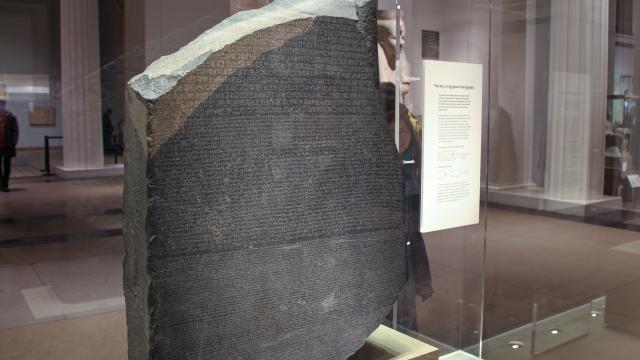Nearly 200 years after the Rosetta Stone was deciphered, unlocking the key to understanding Ancient Egyptian heritage, the iconic slab sits far from where it originated. But a group of Egyptian archeologists is hoping to change that, renewing a plea to return the Rosetta Stone back to its birthplace.
The group launched a petition to call on country officials to submit a formal request to England for the return of the Rosetta Stone, which is currently on display at the British Museum, Al-Jazeera reported. The petition has garnered around 2,500 signatures so far.
The Rosetta Stone was found in 1799 by French soldiers during Napoleon Bonaparte’s invasion of Egypt. Following the defeat of the French army by the British, the stone was declared as property of the British, along with 16 other antiquities that the French had dug up. It has been on display at the British Museum since 1802, and the former colonizers of Egypt really don’t want to give it back.
The stone is part of a larger stone slab with a message inscribed in three different transcripts; hieroglyphics, demotic (cursive Egyptian script for everyday use), and Ancient Greek. When it was first discovered, nobody knew how to read hieroglyphics, the language of the Ancient Egyptians. But in the early 19th century, scholars were able to use the Ancient Greek writing to crack the code of the Rosetta Stone, and finally, understand the language of Ancient Egypt.
The significance of the Rosetta Stone holds especially true for Egyptians, allowing them to understand the history and culture of their ancestors. But as the British Museum notes on its website, the Rosetta Stone is, “one of the most famous objects in the British Museum,” even though the stone signifies the country’s colonial history. Aside from the Rosetta Stone, the British Museum has tons of stolen artifacts that it refuses to return to their rightful owners.
But there may be hope that with enough pressure, the museum could relinquish some of the stolen pieces of other people’s history. In August, the British Museum agreed to return 72 artifacts that were looted from Nigeria over a hundred years ago during a British military invasion back to the Nigerian government. Nigeria had been asking for its stolen artifacts for decades before the British Museum finally decided to return them. The institution only relented after a 2018 attempt to get Nigeria to accept a temporary loan of the objects instead.
Egypt, on the other hand, has had no luck negotiating the return of its stolen artifacts. The Egyptian government has also been requesting the return of the bust of Queen Nefertiti from Germany for decades, but the German government has repeatedly refused to give back the 3,400-year-old queen’s statue. Egyptian artifacts are littered all over the world in various exhibits, meanwhile, Egypt relies on its ancient history to promote its tourism industry. The industry employs a hefty workforce of around 2 million people and is an important source of foreign currency for the country.
